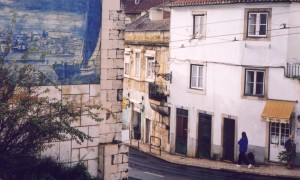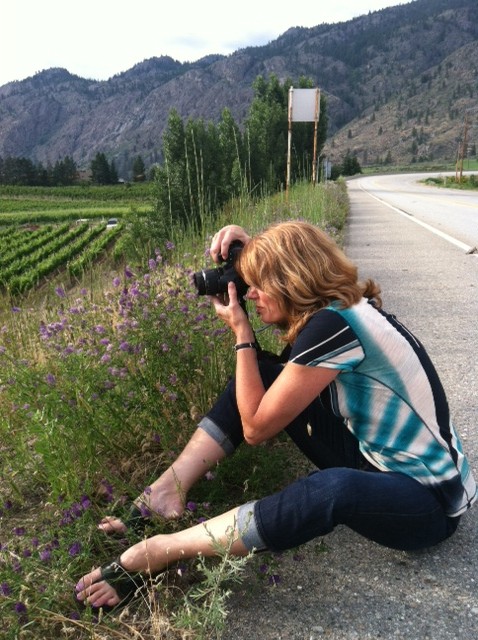LISBON Fleeing the routine frenzy of the season, DIANE PENWILL immerses herself in the city’s ancient Christmas Eve traditions
Article appeared in the Globe & Mail national newspaper
LISBON — It was the beginning of Christmas week, and I was alone in Lisbon. I had come to the Portuguese capital to avoid looking at the same lights and living rooms as the year before.
I hadn’t chosen Lisbon because of the weather, but the rain became an intrinsic part of the experience. 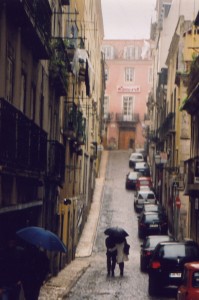
The showers were warm, gentle, silky, ethereal — I found myself gliding through them, like a canoe on a rainy lake where sky, skin and water merge. By the time Christmas was over, I had memorized the Portuguese phrase for raining cats and dogs: chover a cantaros.
The guesthouse where I stayed, Pensao de Sao Joao da Praca, was in a magical location: across from the Romanesque SÈ, Lisbon’s cathedral and the oldest church in the city. The pensao was close to everything, making it perfect for walking. My room had a wrought-iron balcony that overlooked the SÈ on one side.
Because of the narrow street, it was so close that I could look right into the medieval heart of the cathedral. The view on the other side looked out over the undulating sea of red-tiled roofs in the Alfama district.
Lisbon is surrounded by small hills. The older districts, such as Alfama and Bairro Alto, rise up steeply opposite each other. The families who live in the narrow, cobbled streets of the Alfama quarter seem to goabout life much as they have since the Middle Ages. I watched them scurry from shop to shop on Christmas Eve, getting ready for the most important night of the year. The stores — selling cheese, meat and pastry, wine and port — were mostly without signs, with doorways cut into the thick-walled stonebuildings.
On the morning of Christmas Eve, I sampled port in one cluttered shop where a little table was set up fortasting. I was the only customer and had the proprietor’s undivided attention.
“You have a wonderful selection,” I said as he poured me a rather large sample glass, beaming with pleasure.
“It will keep you warm in the rain,” he replied, pouring me another large glass.
Already full of Christmas spirit by 11:30 a.m., I was again seduced by the warm rain, giving me the incentive to walk around the city for a few hours more before stopping for a late lunch.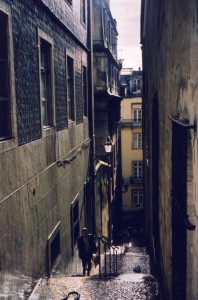
I climbed steadily through the drizzle up a long, winding Alfama street and finally stopped at a small, noisy restaurant that was covered from floor to ceiling in slightly faded blue-and-white azulejos (tiles). It was filled mainly with local working men. Finished work early for Christmas, they were in festive moods, eating heartily in spite of the feasting to come. Lunch was peas, onions and bacon with an egg on top, served with a robust Portuguese table wine. 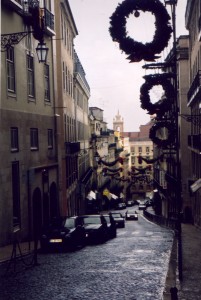
I left the restaurant and noticed the shops starting to close. By 4 p.m. the only stores still open were in the Baixa area, a pedestrian thorough fare with an elegant display of Christmas lights. Window-shopping couples held hands as they strolled down the tiled avenues. Santa was refreshingly absent, and there was none of the frenzy of last-minute shopping that characterizes Christmas Eve in North America.
The custom in Lisbon on Christmas Eve is to go to a midnight mass known as Missa do Galo, or Rooster’s Mass, so called because a crowing rooster is believed to have signalled the birth of Jesus. It rained incessantly during mass at the SÈ, the thunder intermittently louder than the choir. I tried to imagine how the voices would have sounded in medieval times as they carried through the narrow back alleys.
After the church service, the streets filled with laughing Lisboans who were heading home for the feast known as the Consoada, which takes place in the wee hours of Christmas Day.
Back at my pensao, the owner’s extended family had congregated in the living room.
“Feliz Natal!” they greeted me, and encouraged me to try some of the traditional food of the Consoada: boiled dry codfish, steamed potatoes, chick peas and vegetables in olive oil followed by doughy sweets and brandy.
Following Portuguese tradition, they had set extra places at the table for the alminhas a penar (the soulsof the dead) and had provided them with food, hoping for good fortune in the coming year. As Ireluctantly headed to my room around 3 a.m., the festivities had not yet wound down. 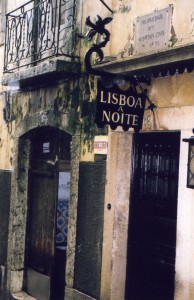
When I woke later on Christmas morning, there was a hush over the city. Staying up most of the night feasting with the souls of the Consoada had left most Lisboans exhausted. I wandered through the rainy streets for several hours, finding everything closed.
The next day, by contrast, everyone was out. I couldn’t find a place to eat that wasn’t packed to the rafters.
The colourful Christmas lights were visible through gaps in the black sea of umbrellas that formed abobbing roof over the merrymakers. As I fell asleep that night, I would dream about slippery rain on the brightly lit tile streets, which reflected the streetlights.
Now that I am home, I remember those umbrellas, people standing in doorways waiting for the rain to stop, and the Christmas lights shining defiantly through the downpour.
If you go
Where to stay: Pensao de Sao Joao da Praca: Rua S. Joao da Praca 97-20-30; phone: 351 (1) 886 2591.
Information: For more information on Lisbon and Portugal, call the Portuguese Trade and Tourism Commission inToronto at 416-921-7376, or visit the website at http://www.portugal.org.
Media
View Print Version of Article
Map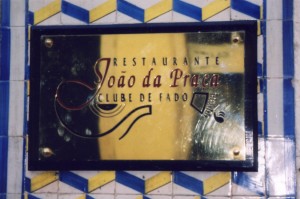
You can follow any responses to this entry through the RSS 2.0 You can skip to the end and leave a response. Pinging is currently not allowed.

